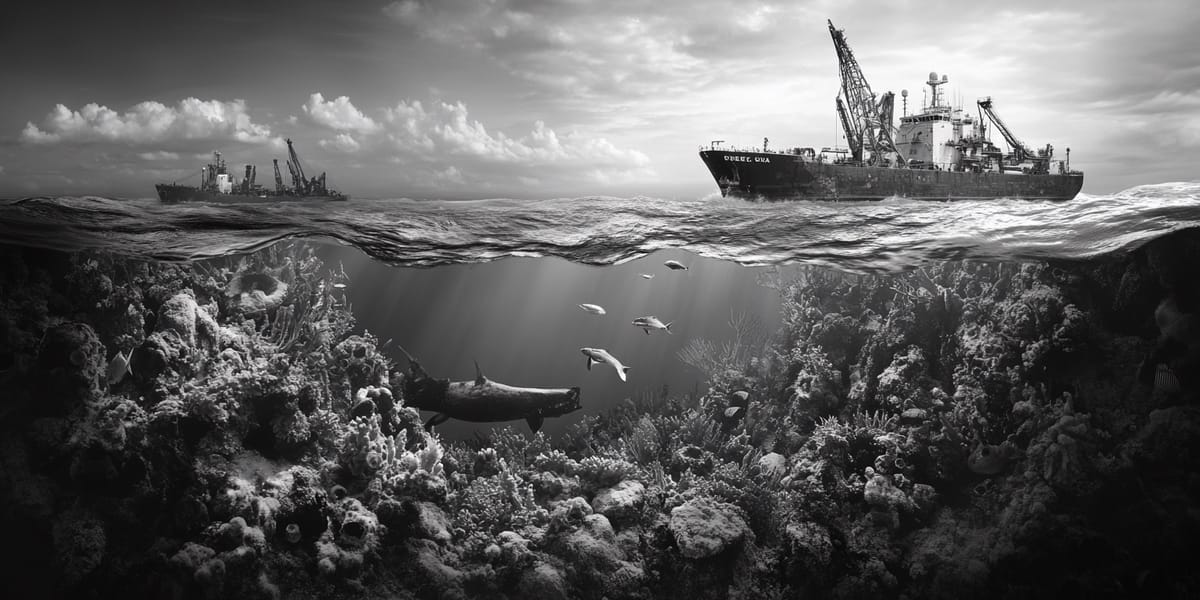Deep Sea Mining Tensions Rise at Global UN Ocean Summit in France

The third UN Ocean Conference opened in Nice, France on June 9, 2025, with deep sea mining emerging as a contentious issue dividing the international community. French President Emmanuel Macron called for a moratorium on deep sea mining during his opening address, declaring it "madness to launch predatory economic action that will disrupt the deep seabed." The five-day summit, co-hosted by France and Costa Rica, aims to accelerate ocean conservation efforts and address mounting environmental threats facing marine ecosystems.
Deep sea mining has become a flashpoint between nations after US President Donald Trump signed an executive order in April 2025 to fast-track seabed mining permits, bypassing the United Nations framework. The move has drawn sharp criticism from the International Seabed Authority (ISA), which governs mineral extraction in international waters covering 54% of the seabed.
Rising Geopolitical Tensions Over Seabed Resources
Radio Free Asia reports that Trump's executive order specifically aims to "counter China's growing influence over seabed mineral resources." The directive instructs the Commerce Secretary to expedite mineral exploration licenses and commercial permits within two months. China currently holds five ISA exploration licenses and has steadily built influence over seabed governance through regional partnerships.
The Metals Company, a Canadian startup, announced plans to seek US approval for the world's first commercial deep sea mine by June 2025. CEO Gerard Barron stated the executive order represents "a pivotal return" to US leadership in deep sea minerals. However, NPR notes that legal experts consider unilateral US action a clear violation of international law, potentially undermining America's legitimacy in enforcing maritime rules globally.
ISA Secretary-General Leticia Carvalho condemned the US approach, stating that "any unilateral action would constitute a violation of international law and directly undermine multilateral cooperation." Axios reported that 32 countries have called for a pause or moratorium on deep sea mining given unknown environmental risks.
Environmental Impact and Scientific Concerns
Marine biodiversity faces unprecedented threats, with NRDC reporting that over one-third of marine mammals and nearly one-third of sharks are threatened with extinction. The Clarion Clipperton Zone in the Pacific, targeted for nodule mining, contains an estimated 88-92% undescribed species according to recent research.
Deep sea mining operations would extract potato-shaped polymetallic nodules containing nickel, cobalt, copper and manganese from ocean floors several kilometers deep. Proponents argue these minerals are essential for electric vehicle batteries and renewable energy technologies. However, scientists warn about potentially irreversible damage to marine ecosystems that remain poorly understood.
France24 notes that only 2.7% of oceans are effectively protected from destructive activities, far below the 30% target by 2030. Marine fish abundance has declined 38% since 1970, while coastal habitats like seagrass beds and mangroves have been depleted by over two-thirds.
Economic Arguments and Industry Perspectives
The global deep sea mining market is projected to grow at 37.1% annually from 2020 to 2030. Industry advocates emphasize reducing dependence on terrestrial mining and Chinese mineral supply chain dominance. The US Geological Survey estimates the Clarion Clipperton Zone contains more nickel, cobalt and manganese than all combined terrestrial reserves.
Congressional testimony revealed divided opinions on economic viability. Representative Maxine Dexter called seabed mining a "high-risk, low-reward endeavor" citing high operational costs and volatile mineral markets. Chemical & Engineering News reported that demand for nickel and cobalt in electric vehicle batteries is declining as manufacturers shift to lithium iron phosphate alternatives.
However, mining companies argue seabed extraction generates less environmental impact than terrestrial mining. The Metals Company completed successful field tests in 2022 using collector vehicles that vacuum nodules from the seafloor through miles-long tubes to surface ships.
Global Implications and Future Outlook
The UN Ocean Conference represents a watershed moment for international ocean governance. France leads diplomatic efforts to expand the moratorium coalition beyond 33 current supporters. The conference aims to finalize the High Seas Treaty ratification, which requires 60 countries but has achieved only half that number.
IRIS analysis suggests 2025 could be an institutional turning point for seabed exploitation. The ISA has set July 2025 as an aspirational deadline for finalizing mining regulations, though consensus among all 36 member states remains elusive.
The Nice Ocean Action Plan will establish voluntary commitments and a political declaration addressing three priorities: completing multilateral ocean processes, mobilizing SDG 14 financing, and strengthening marine science knowledge for policymaking. Success depends on whether nations can bridge the fundamental divide between economic interests and environmental protection in governing the global commons.
Related Reading on Morrow Report
Explore the Alternative Financial Systems Index to understand how various financial systems worldwide are creating alternatives to traditional banking and economic structures. This comprehensive analysis examines transaction costs, user adoption rates, and effectiveness metrics across decentralized finance, community banking, microfinance, and digital payment networks. The index provides valuable insights into how emerging financial systems achieve higher efficiency and broader accessibility compared to conventional institutions, with quantitative data showing systems with transaction costs below 0.5% of traditional finance demonstrating three times higher adoption rates.




